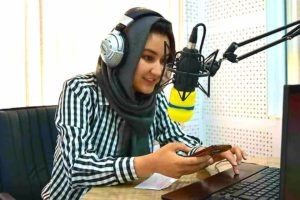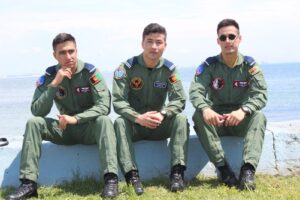The thermometer only shows a limited number of degrees above zero. The windows of the cars are slightly fogged up. Passengers keep them closed because of the cold autumn mornings. Some are wearing jackets, although the cold hasn’t set in yet, but the mornings are really chilly. The radio and the driver’s soft words, the silence and sadness of some passengers represent the stories of their lives. Everyone has a problem.

I look outside, at people, at a man who is busy grilling in his restaurant and encouraging others to eat kebabs. To the women who hurriedly cross the street, to the child laborers with their big plastic bags who rummage through the trash can. To the drug addicts who don’t differ from the street dirt when they don’t move.
There are men and women waiting at the bus station, and taxi and tricycle drivers who are eagerly waiting for passengers and shout out the names of the routes in the hope of a passenger. I think to myself, “Life is still going on. Even in the lower layers of the skin of the city, the struggle to survive continues.

I reflect my life. I’m Atefa Alizadah. A journalist from Afghanistan. A girl who loves life and sees challenges and obstacles as opportunities. I grew up in Herat. A city with a traditional structure and full of taboos. where you have to fight for freedom every moment and break taboos. What I’ve done over the years.
When I graduated from university seven years ago, I wasn’t that inquisitive. Now I realize that as our participation in society changes over time, so do our views of life and the world around us.
I started working as a journalist first in the local media of Herat. I worked for Esteqlal and Saqi television, as well as for local radio stations like Youth Voice and Meraj. In the last case, I wrote reports for some national and international media outlets, such as Nimrukh News Agency, Rukhshana Media, and The Kabul Times.
Several of my joint investigative reports have been published in the Guardian and the Times. The creation of several video and audio documentaries is also part of my journalistic career. I loved and enjoyed my work. I also received status from media organizations after some of my reports were published, which increased my love for my work.
It felt good to write about different aspects of life and people in society. Sometimes I have reported on the misery of a section of society. It has been difficult to write about poverty, but the feedback I have received on my writing has been encouraging. Some people then started getting involved to help those in need. I used to write insightful reports. The government formed a committee to investigate the affairs. I enjoyed all of that.
 I remember saying good morning to everyone in town over the radio early in the morning. For hours I moderated programs as a world full of empathy and positive energy. There was no tiredness because I hoped for the future and I did my best to ensure that it should bring better days.
I remember saying good morning to everyone in town over the radio early in the morning. For hours I moderated programs as a world full of empathy and positive energy. There was no tiredness because I hoped for the future and I did my best to ensure that it should bring better days.
I was also teaching journalism for a while in one of Herat’s private universities.
It felt good to pass on my theoretical knowledge and journalistic experience to the students. As well as being a professional journalist, I am also particularly interested in reading poetry, novels and stories.
My media career is about a decade old and I’m happy with what I’ve written so far. I was sometimes the voice of the underprivileged. I wrote about their sorrows and suffering. I have written about those who have been deprived of their basic human rights and people whose voices should have been heard. The experience of seven years as a journalist has taught me that this profession is a wonderful school of life. A reporter acts as the eyes, ears and mouthpiece of society. In a little less than ten years as a journalist, I have tried to be the voice of the disadvantaged and convicted in society and to make them heard.
 In all my years as a journalist I fought for freedom, human rights and women’s consciousness. It was about women, who were marginalized and living in areas, where they were denied even their basic human rights. It wasn’t difficult to understand them. Maybe because we share the same sex. All my efforts have been to lay the groundwork for their awareness through these reports.
In all my years as a journalist I fought for freedom, human rights and women’s consciousness. It was about women, who were marginalized and living in areas, where they were denied even their basic human rights. It wasn’t difficult to understand them. Maybe because we share the same sex. All my efforts have been to lay the groundwork for their awareness through these reports.
Women should be aware of their rights. But the painful reality is that these women are now even more isolated than before, with no one standing up for their rights. I’m very worried about how they live, who’s listening to them now? And who informs them? Before the fall of Afghanistan, I was the voice of these women. Women sentenced to silence because of men. Now the situation has shut my mouth. It’s painful that I’ve become one of them now.
In fact, after a year, even the humblest people in society have changed their lives. Although the streets and the houses are the same, the people are not the same as they were a year ago because their pain and suffering have increased and their hope for the future has dwindled.

Many people were displaced or emigrated. In the last year, hundreds of my colleagues have left the country. One of them is my dear friend Somaia Valizadeh, she moved to Istanbul. Many, who stayed, especially journalists, lost their jobs. Some had to change jobs. Some have become depressed due to forced unemployment and sitting at home. In the same way, we lost some of the best in the media community and other elites in society, which was definitely the worst and most bitter part of this change.
According to statistics, more than 60 women journalists worked in Herat alone before the collapse of the republic. Now this number is reduced to the number of fingers on one hand. There isn’t much more to say. The right to breathe depends on what we say or don’t say. In fact, we live in the midst of censorship and self-censorship.
Being a female journalist is more difficult today than ever. I’ve been unemployed for a year. My previous media outlet fired me because of my gender and ethnicity (Shia and Hazara). I used to contribute to the household income together with my father; now i’m unemployed although i could work if i was allowed to.

With the fall of the Republic, every hope and dream I and others had for the future we had envisioned was shattered and shattered. Despite all this, I am convinced that I will never leave this profession. At a time when desperation is spreading everywhere and everyone is facing an uncertain future, I firmly believe that society needs a reporter like me right now more than ever.
But one cannot deny the changed conditions and the journalists who have been beaten, tortured and even killed during this time cannot be ignored.
I think again of that man over there at the grill, about the women who hurry down the street; the poor children of the city and the people who are still struggling to survive. I think of my dreams and desires. Then I realize that my primary responsibility and mission has only just begun. I and my contemporaries must strengthen hope for a better life in our divided society. No doubt there will be tough times, but we have to fight for better days. Crises also offer opportunities. We should seize these opportunities to create a better future in our country and fight for life and not give up.






